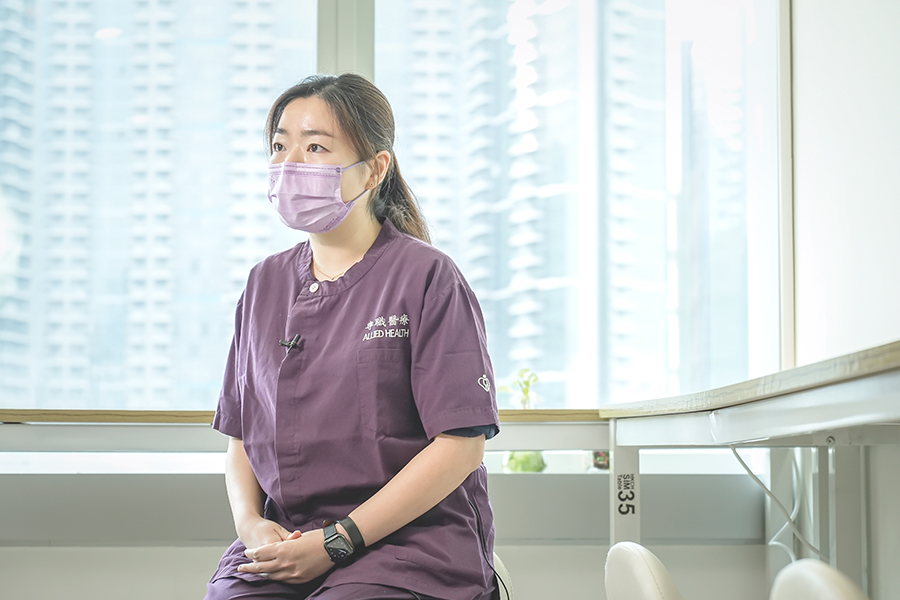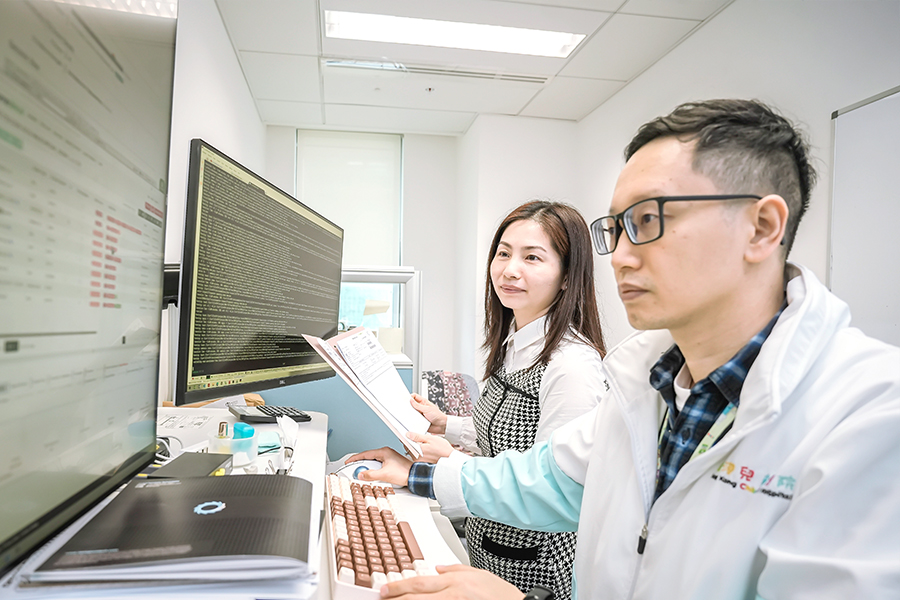New posts
Two essential posts are created in the provision of genetic service: Genetic Counsellor and Bioinformatician. They counsel patients and analyse data to help doctors to make a diagnosis respectively.
 Connie Shih looks into a patient’s genetic future by studying their family backgrounds, provides counselling for risk assessments, carries out tests on patients after obtaining informed consent, and explains the results to patients and their family members. “Undergoing a genetic test is like drawing a fortune stick, and the report can sometimes be as obscure as the ancient fortune poems,” Connie explains. “A genetic counsellor acts like a fortune teller and interprets the results for the patient so they can understand them and adapt to the implications.”
Connie Shih looks into a patient’s genetic future by studying their family backgrounds, provides counselling for risk assessments, carries out tests on patients after obtaining informed consent, and explains the results to patients and their family members. “Undergoing a genetic test is like drawing a fortune stick, and the report can sometimes be as obscure as the ancient fortune poems,” Connie explains. “A genetic counsellor acts like a fortune teller and interprets the results for the patient so they can understand them and adapt to the implications.”
Most Genetic Counsellors have a medical-related background and studied genetic counselling, biomedical sciences, nursing, social work, psychology, science, medical science or equivalent at the university level.
 Most genetic tests can be done by a simple blood test which provides a vast amount of raw data following gene sequencing. The data can be as large as 10G or even 100G for each patient. Susie Su and Dr Feng Wu say the role of a bioinformatician involves designing and implementing workflows for the systematic collection, storage, and retrieval of genetic and genomic data by using bioinformatics software and tools. They analyse and annotate genomic data with the latest clinical evidence and guidelines, integrating information from various bioinformatics databases and research findings to assist doctors in patient diagnosis. Additionally, they are responsible for maintaining up-to-date databases of patient and genetic information. They also closely communicate with clinicians and genetic counsellors for case discussions and share knowledge about guideline updates.
Most genetic tests can be done by a simple blood test which provides a vast amount of raw data following gene sequencing. The data can be as large as 10G or even 100G for each patient. Susie Su and Dr Feng Wu say the role of a bioinformatician involves designing and implementing workflows for the systematic collection, storage, and retrieval of genetic and genomic data by using bioinformatics software and tools. They analyse and annotate genomic data with the latest clinical evidence and guidelines, integrating information from various bioinformatics databases and research findings to assist doctors in patient diagnosis. Additionally, they are responsible for maintaining up-to-date databases of patient and genetic information. They also closely communicate with clinicians and genetic counsellors for case discussions and share knowledge about guideline updates.
A bioinformatician usually studied bioinformatics, clinical science, biomedical science, computer science, statistics or related discipline, with expertise in programming and coding.
Genetic Counsellor: The genetic fortune teller
 Connie Shih looks into a patient’s genetic future by studying their family backgrounds, provides counselling for risk assessments, carries out tests on patients after obtaining informed consent, and explains the results to patients and their family members. “Undergoing a genetic test is like drawing a fortune stick, and the report can sometimes be as obscure as the ancient fortune poems,” Connie explains. “A genetic counsellor acts like a fortune teller and interprets the results for the patient so they can understand them and adapt to the implications.”
Connie Shih looks into a patient’s genetic future by studying their family backgrounds, provides counselling for risk assessments, carries out tests on patients after obtaining informed consent, and explains the results to patients and their family members. “Undergoing a genetic test is like drawing a fortune stick, and the report can sometimes be as obscure as the ancient fortune poems,” Connie explains. “A genetic counsellor acts like a fortune teller and interprets the results for the patient so they can understand them and adapt to the implications.”
Most Genetic Counsellors have a medical-related background and studied genetic counselling, biomedical sciences, nursing, social work, psychology, science, medical science or equivalent at the university level.
Bioinformatician: The data interpreter
 Most genetic tests can be done by a simple blood test which provides a vast amount of raw data following gene sequencing. The data can be as large as 10G or even 100G for each patient. Susie Su and Dr Feng Wu say the role of a bioinformatician involves designing and implementing workflows for the systematic collection, storage, and retrieval of genetic and genomic data by using bioinformatics software and tools. They analyse and annotate genomic data with the latest clinical evidence and guidelines, integrating information from various bioinformatics databases and research findings to assist doctors in patient diagnosis. Additionally, they are responsible for maintaining up-to-date databases of patient and genetic information. They also closely communicate with clinicians and genetic counsellors for case discussions and share knowledge about guideline updates.
Most genetic tests can be done by a simple blood test which provides a vast amount of raw data following gene sequencing. The data can be as large as 10G or even 100G for each patient. Susie Su and Dr Feng Wu say the role of a bioinformatician involves designing and implementing workflows for the systematic collection, storage, and retrieval of genetic and genomic data by using bioinformatics software and tools. They analyse and annotate genomic data with the latest clinical evidence and guidelines, integrating information from various bioinformatics databases and research findings to assist doctors in patient diagnosis. Additionally, they are responsible for maintaining up-to-date databases of patient and genetic information. They also closely communicate with clinicians and genetic counsellors for case discussions and share knowledge about guideline updates.
A bioinformatician usually studied bioinformatics, clinical science, biomedical science, computer science, statistics or related discipline, with expertise in programming and coding.